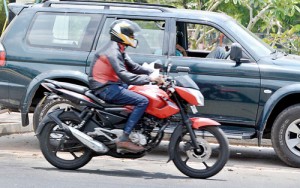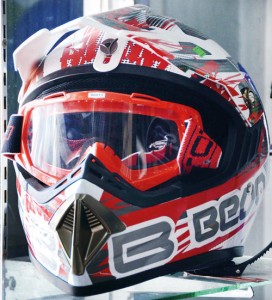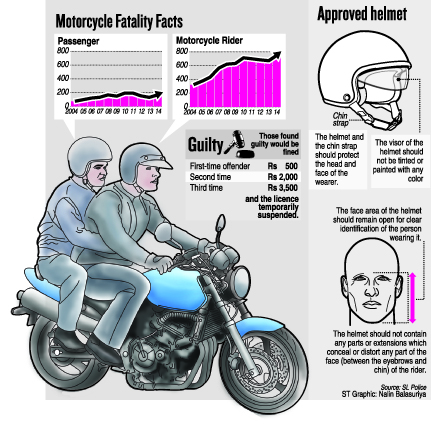News
Helmet ban faces rethink amid bike rider objections
Before the police ban on full-face helmets becomes effective on Thursday, Public Order Minister John Amaratunga will ask the National Security Council to reconsider the decision, considering hundreds of thousands who reject the clampdown.

What about our safety? A question that most bike riders ask. Pix by M.D. Nissanka
“I was taken by surprise when I heard that the police are going to implement that regulation even after we have decided to postpone it. I was not consulted when they decided this. It was decided at the security council meeting with the Inspector General of Police,’’ Minister Amaratunga, who is also responsible for Disaster Management and Christian Affairs, told the Sunday Times.
He added that when he initially opposed the ban, his idea that a survey be done to gauge public opinion, was disregarded.
Only a minute number of robberies have been committed by suspects wearing full-face helmets and that is no justification for a ban, he argued.
“We can explore the possibility of modifying the full faced helmet while protecting the chin area,” he suggested.
T. Perinpanayagam, former deputy inspector general of traffic, and one of the chief architects of the Motor Traffic Act of 1991, said the police are interpreting the act incorrectly. The act is clear that a helmet with transparent visor  that does not conceal the face from forehead to chin can be worn.
that does not conceal the face from forehead to chin can be worn.
“The law is very clear. Riders can wear those types of helmets without making identification difficult. Also the visor should be 70 percent transparent and not tinted,” he said.
Mr. Perinpanayagam is not convinced that the helmet ban will end robberies and instead favours action against unlicensed guns.
Police spokesman Ruwan Gunasekara this week announced that the helmet ban will be effective from April 2 and violators face a fine of Rs 500.
“Our main concern is the increasing number of crimes which lead to identification issues when we produce suspects in courts. Besides, the past five-year accident history indicates that even though riders have been using full face helmets, the death toll from motorbike accidents is increasing,” he said.
He pointed out that according to the Motor Traffic Act (No. 21 of 1981), motorcycle riders or the pillion riders should wear a protective helmet of a type approved by the Transport Ministry.
“The Act clearly states that the helmet and the chin strap should protect the head and face of the rider and it should be possible to recognize the rider from nearly 25 metres,’’ he said.
The police first imposed the ban on March 21. Soon after the

announcement, Minister Amaratunga lifted the prohibition.
Motorbike riders say the police who have failed to contain crime are targeting them.
“They talk about security and identification, what about our safety? We have every right to take maximum precautions. Nobody can say what we should wear when we are riding. It is up to each individual to decide his own security, not the police,” said a sales agent who rides a motorbike.
Victor Perera from Maradana considers it outrageous to punish citizens who are trying to protect themselves from head injuries.
“Protection and safety should not be compromised. It is a violation of a basic human right. Riders have the right to protect themselves. Nobody can question that,” he said.
Head of the Department of Transport and Logistics at the University of Moratuwa Dr. T. Sivakumar said authorities should identify the root cause of this issue, while considering the safety of motorbike riders.
He said there also social issues to consider including the health of riders.

